七年级英语上册Unit6学案
牛津译林版七年级英语上册unit6第3课时教案 导学案 课时练习
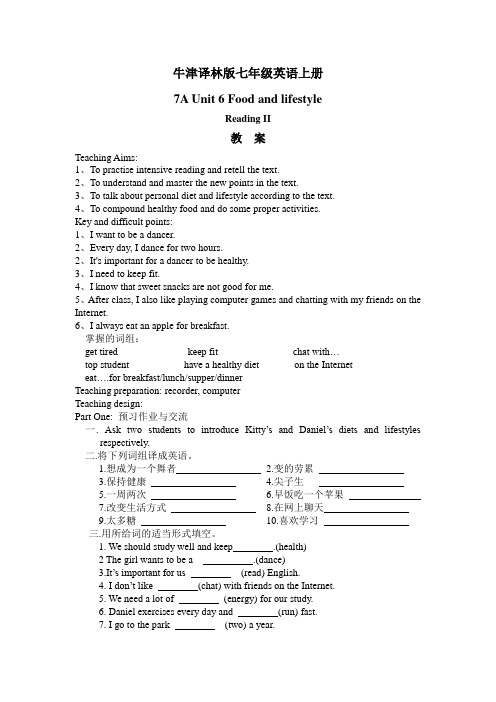
牛津译林版七年级英语上册7A Unit 6 Food and lifestyleReading II教案Teaching Aims:1、To practise intensive reading and retell the text.2、To understand and master the new points in the text.3、To talk about personal diet and lifestyle according to the text.4、To compound healthy food and do some proper activities.Key and difficult points:1、I want to be a dancer.2、Every day, I dance for two hours.2、It's important for a dancer to be healthy.3、I need to keep fit.4、I know that sweet snacks are not good for me.5、After class, I also like playing computer games and chatting with my friends on the Internet.6、I always eat an apple for breakfast.掌握的词组:get tired keep fit chat with…top student have a healthy diet on the Interneteat….for breakfast/lunch/supper/dinnerTeaching preparation: recorder, computerTeaching design:Part One: 预习作业与交流一. Ask two students to introduce Kitty’s and Daniel’s diets and lifestylesrespectively.二.将下列词组译成英语。
上海版英语七年级上Unit 6 Travelling the Asia 学案
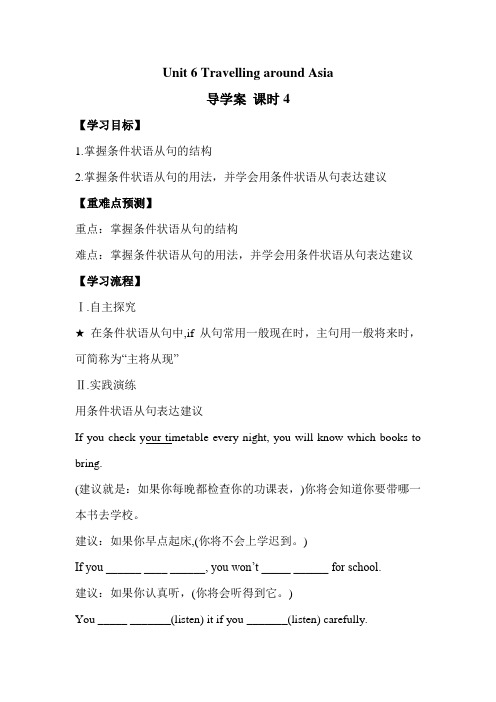
Unit 6 Travelling around Asia导学案课时4【学习目标】1.掌握条件状语从句的结构2.掌握条件状语从句的用法,并学会用条件状语从句表达建议【重难点预测】重点:掌握条件状语从句的结构难点:掌握条件状语从句的用法,并学会用条件状语从句表达建议【学习流程】Ⅰ.自主探究★在条件状语从句中,if从句常用一般现在时,主句用一般将来时,可简称为“主将从现”Ⅱ.实践演练用条件状语从句表达建议If you check your timetable every night, you will know which books to bring.(建议就是:如果你每晚都检查你的功课表,)你将会知道你要带哪一本书去学校。
建议:如果你早点起床,(你将不会上学迟到。
)If you ______ ____ ______, you won’t _____ ______ for school.建议:如果你认真听,(你将会听得到它。
)You _____ _______(listen) it if you _______(listen) carefully.Ⅲ.合作交流“条件句+ ,+ 主句.”= “主句+ 条件句.”If you make the wheels round, they will turn easily.= They will turn easily if you make the wheels round.If she doesn’t get home on time, her mother will be worried.=__________________________________________________________ __________Ⅳ、知识梳理If you make the wheels round, they will turn easily.(make/turn)像这样的句子练习,难度大点。
人教版英语七年级上册U6 Do you like bananas复习学案

Review of Unit 6 Do you like bananas? 第一部分:基础知识梳理Part 1:重点单词同步检测:1.1 have hamburgers for b2.Here are some tomatoes.Do you like t3.1 like French f1.1have some ice c5.Children should(应当)eat lots of v6. What do you have for d?7.Zhou Jielun is a singing s8.She eats h food every day.Part 2:根据汉语或英语提示翻译下列短语1. 一个苹果/蛋2. 两个汉堡包3. 一些西红柿11.所有的蔬菜12.体育明星13.吃得好4 . 一些牛奶/沙拉5 .许多草莓6 .许多面包7 . 一些牛奶/沙拉8 .许多草莓9 .许多面包14 .她的饮食习惯15 .吃早/午/晚餐16 .作为早/午/晚餐17 .健康的食物.最后一个问题 18 .问某人有关某事.想要做某事 想要某人做某事同步检测:Everyone knows 1.is very important for our health. If you 2. eat healthily, the following tips (提示) may be helpful to you.Firstly, 3.the food you should eat. Do you4. 5. meat? We can have some fish, chicken and pork (猪肉)every day, but we should not eat too much meat. Besides, don't eat ice-cream a lot, or you will 6.. Secondly, you should have a good 7.. When you 8.a sports star his habits in eating, he may tell you to have many kinds of food every day. It is not good to 9.too much food. You may find it difficult to fall asleep (睡着).10.pay attention to (注意)our eating and have a healthy body.书面表达你有健康的饮食习惯吗?假设你是David,下面是你总结的自己的三餐喜好,请 根据表格内容写一篇短文,介绍你自己的饮食习惯。
鲁教版七年级英语上册Unit6复习学案

鲁教版七年级上Unit 6复习学案【基础知识回顾】一、听写单词1. n.家务劳动;家务事___________2. adv.几乎不;几乎没有__________3. adv.在任何时候;从来;曾经_____________4.几乎从不_____________5. adv.一次;曾经_________6.adv.两次;两倍________7.n.(国际)互联网;因特网___________8.n.节目__________9.adj.忙的;满的;充满的______10.n.摆动;秋千v.(使)摆动;摇摆__________ 11.n.摇摆舞_________12.adv.大概;或许;可能_______13.adv.最小;最少adj.最小的;最少的_________14.至少;不少于;起码_________ 15.n.无用的东西;无价值的东西_________16.n.垃圾食品___________17. n.咖啡________18. n.结果;后果________19.n.百分之…_________20. adj.在线的;联网的_________21.n.电视节目;电视机_________22.conj.虽然;尽管;即使_____________23.prep.以;凭借;穿过__________24.n.头脑;心智_________25.n.身体_________26. adj.这样的;那样的;类似的___________27.例如;像……这样_________28.adv.在一起;共同_________29.v.消失;灭亡;死亡_______30.n.作者;作家___________31.n.牙科医生________ 32.n.杂志;期刊_________33.adv.然而;不过___________34.prep. & conj.(用以引出比较的第二部分)比_________35.多于____________36.adv.几乎;差不多_____________37.pron.没有一个;毫无________38.adv.较少;较小adj. & pron.较少的;更少的_______39.少于_______40.n.得分;点_________二、词组翻译1.帮着做家务____________2. 买东西_____________3.去看电影_______________4. 一月一次_______________5.使用互联网_______________6.读英语书_______________7.一周三次_______________ 8.上舞蹈和钢琴课_______________9.熬夜_______________ 10.至少______________三、句型体验(一)翻译句子1. ——你多久给锻炼一次? ——两周一次。
七年级英语上册 Unit 6 How do you go to school教案 鲁教版

Unit 6 How do you go to school?I.Teaching Aims and Demands:1.Knowledge ObjectsKey vocabularyTarget language2.Ability ObjectsListening skillWriting skillCommunicative competence.3.Moral ObjectKnow about some traffic rules.II.Teaching Key Points:Key vocabulary: subway, take the subway, train, ride a bike, take the bus,take the train, walk, take a taxiIII.Difficult Points:Target language:Hey, Dave. How do you get to school?I walk. How about you, Sally?I ride my bike.How does Mary go to school?She takes the train.IV.Teaching Methods:Listening method.Pair workV.Teaching Aids:A tape recorder.A projector.Pictures.Word cards.VI.Teaching Procedures:Step One: Greet the class as usual.(Talk about the weather. Use Present tense and Past tense. )T: How’s the weather today?S: It is…….T:How was the weather like yesterday?S: It was…….(强化交际能力,检查复习学过知识)Step Two: New wordsShow some pictures of the new words on the screen. Ask students to try to read these words.bike, train, subway, car, ship, boat, bus, airplaneMaybe there is only one new word for students---subway, so the teacher only correct the pronunciation of these words.There is a words game.( Ask students to look through the new words quickly, then check how many they can remember. Give students some pictures about the new words and some word cards. The teacher show the new words or the pictures of the new words on the screen. If the teacher show the word “train” to the students, the student who got the picture of the train should stand up quickly and say “I’m here!” And so on.)(通过多媒体屏幕向学生展示所学单词,图文并茂,非常直观地向学生展示了新单词.简单的单词游戏既调动了学生的学习积极性又强化了单词记忆。
七年级英语导学案

七年级上册英语学科导学案课题: Unit 6 Do you like bananas? 课型:新课主备人:陈宗理授课人:陈宗理班级:七年级上册学生学案教师导案Unit 6 Do you like bananas?第1课时SectionA1a—1c【学习目标】:1. 识记本课单词和短语,并能把本课句型灵活运用到口语交际中。
词汇: like, banana,hamburger,pear,milk,salad, strawberry, tomato, broccoli, French fries, ice cream.句型“Do you like …?” “Yes, I/we do . / No, I/we don’t.”I like oranges. I don't like oranges.2.学会用like谈论对方喜欢或不喜欢的食物【学习重点、难点】:1.本课词语及名词的复数形式。
2.灵活运用“Do you like sth.?【学法指导】:预习中自主学习,课上积极参与小组讨论、合作、探究。
【知识链接】:like的用法。
【学具准备】:导学案、活页夹、双色笔、纠错笔、实物、图片。
【学习过程】:一、预习●导学(8')1.同学们,请猜猜我给你们带来了什么?2.一起学习目标。
3.(1)掌握本课单词。
(2)想一想,填一填。
我喜欢橘子. I like _______.你喜欢橘子吗? _____you like ________?(3)通过预习你还有哪些疑问?4.你能将下列单词组及词语准确的读出并写出来吗?(叫同学写在黑板上)香蕉_________汉堡包_______ 西红柿花椰菜一、学习目标1.知识与技能:识记本课单词和短语,并能把本课句型灵活运用到口语交际中。
2.过程与方法:通过听、说练习为主、通过独学和小组合作等方法掌握本节课语法内容。
3.情感态度与价值观:To be friendly to your friends.二、学习重点:Words and expressions. 三、学习难点:How to talk about likes and dislikes.教学过程:导课:用游戏引入预习单词时学生自读划出疑难交流,最后达到全会读。
江苏省徐州市第二十二中学七年级英语上册《Unit 6 Fashion》 Main task学案(无答案) 牛津译林版

Unit 6 of 7A 7.1第七课时 Main task学习目标:1、通过真实的情景,能熟练地运用语言知识。
2、通使用下列短语简单描述人物的打扮design, look really good, be made of, match the clothes very well课前预习:一、翻译下列短语:1、我的时装设计2、一双靴子3、设计别的衣服4、看上去真的很好5、由羊毛制成的6、很配衣服7、那多么漂亮的衣服8、去时装表演二、用括号中所给词的适当形式填空:1. The scarf matches her clothes very . (good)2. All the clothes he designed look (real) good together.3. You know, Simon wants to be a football (play).4. It was great (funny) to go to the Reading club at school.5. Kate the shoes yesterday (sew).课堂检测:一、选择( ) 1. We saw pretty clothes at the shopping mall.A. very muchB. so manyC. so muchD. very many( ) 2. Sandy looked in a hairstyle.A. greatly, 1990’sB. great, 1990’ sC. greatly, 1990sD. great, 1990s( ) 3. The pair of shor boots me ¥200.A. paidB. spentC. lostD. took( ) 4. I tired yesterday. So I go shopping with her.A. am, don’tB. was, am noC. was, didn’tD. am, am not( ) 5. Where were you ?A. just nowB. nowC. goD. before二、用动词的适当形式填空:1. — (do) you go to the cinema last Sunday?—Yes, I . (do)2. What about (play) basketball with us?3. There (be) a lot of people in the shopping mall on Sundays. But last Sunday my mother (not go) shopping. She (visit) my groundparents.4. Look! Daniel (clean) the classroom. Let’s (go) and(help) him.5. —Would you like (walk) with me first?—Sorry. I do my homework first.三、假如你们学校举行一次服装设计大赛,你也想参加,请你写一段约60个单词的短文简单介绍一下你参赛的服装,它们的名称、颜色、质地等。
鲁教版七年级英语上册Unit 6 How often do you exercise ? 复习学案
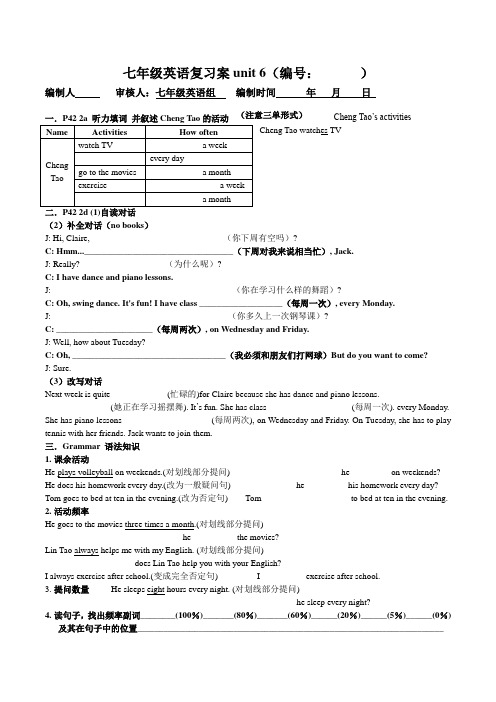
七年级英语复习案unit 6(编号:)编制人审核人:七年级英语组编制时间年月日(2)补全对话(no books)J: Hi, Claire, ______________________________(你下周有空吗)?C: Hmm...__________________________________(下周对我来说相当忙), Jack.J: Really? ___________________(为什么呢)?C: I have dance and piano lessons.J: _________________________________________(你在学习什么样的舞蹈)?C: Oh, swing dance. It's fun! I have class ___________________(每周一次), every Monday.J: ________________________________________(你多久上一次钢琴课)?C: ______________________(每周两次), on Wednesday and Friday.J: Well, how about Tuesday?C: Oh, ___________________________________(我必须和朋友们打网球)But do you want to come?J: Sure.(3)改写对话Next week is quite_____________(忙碌的)for Claire because she has dance and piano lessons. _______________ _______________(她正在学习摇摆舞). It’s fun. She has class ___________________(每周一次). every Monday. She has piano lessons ____________________(每周两次), on Wednesday and Friday. On Tuesday, she has to play tennis with her friends. Jack wants to join them.三.Grammar 语法知识1.课余活动He plays volleyball on weekends.(对划线部分提问) __________ __________he _________on weekends? He does his homework every day.(改为一般疑问句) __________he__________his homework every day? Tom goes to bed at ten in the evening.(改为否定句) Tom__________ __________to bed at ten in the evening.2.活动频率He goes to the movies three times a month.(对划线部分提问)__________ __________ __________ he __________the movies?Lin Tao always helps me with my English. (对划线部分提问)__________ __________does Lin Tao help you with your English?I always exercise after school.(变成完全否定句) I __________exercise after school.3.提问数量He sleeps eight hours every night. (对划线部分提问)__________ __________ __________ __________he sleep every night?4.读句子,找出频率副词________(100%)_______(80%)_______(60%)______(20%)______(5%)______(0%)及其在句子中的位置______________________________________________________________________四.P44 1d 听力填词并根据表格叙述Tina 和Bill 的生活习惯 Both Tina and Bill sleep nine hours every night.Tina’s habits: _________________________________________________________________________________ _________________________________________________________________________________________________________________________________________________________________________________________ Bill ’s habi ts: _________________________________________________________________________________ _________________________________________________________________________________________________________________________________________________________________________________________五.P45 2b What Do No. 5 High School Students Do in Their Free Time?Para 1: Last month we ____________(ask) our students about their_______________(业余活动). The questions were about ________________, __________________ and ______________ in their free time.Para 2: We found that... Para 3: Para 4:Most students use it for___________ and not for ________________Para 5: It is good _____________(relax) by __________(use) the Internet or watching game shows, but we think the best way_________(relax) is through exercise. It is healthy for the __________(头脑) and the ________(身体). Exercise such as___________(play) sports is fun, and you can __________(度过) time with your friends and family as you play_____________(一起/共同). And remember, “_____________________________(积习难改)”. So start ______________(exercise) before it ’s too late.六.Section B 重点短语垃圾食品______________想让某人做某事_____________对...有好处_____________休闲活动____________ 询问某人关于某事___________________上网_____________________问题的答案_____________________ 通过做某事___________________做某事的最好方式___________________通过锻炼___________________ 例如________________和某人共度时光_________________________积习难改________________________ 16岁的________________________多于_________________________少于___________________________ ActivitiesHow often Tina Bill exerciseevery day hardly ever eat fruit and vegetablesevery day ___________ drink __________every day ___________ eat________ ____________or _____times a week _____or _____times a week drink _____________ _____________ _____times a week We all know that many students often goonline, but we were surprised that...The answers to our questions about watching TV were also interesting.Although many students like to watch sports, game shows are themost popular.。
七年级上册 U6导学案,含答案 (牛津、沪教、沈阳)
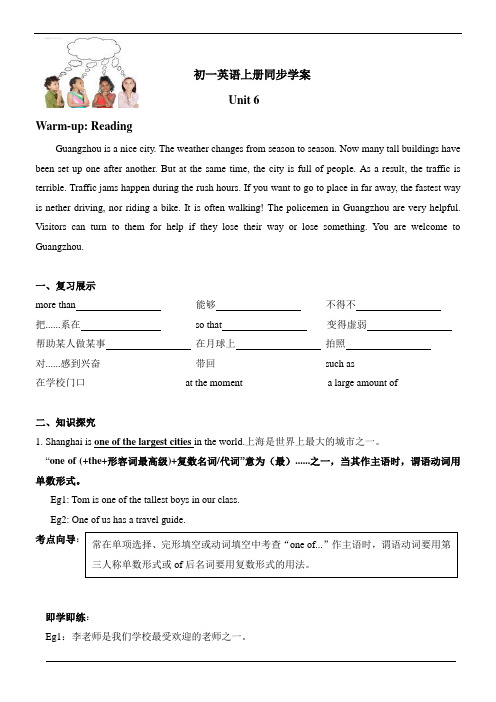
初一英语上册同步学案Unit 6Warm-up: ReadingGuangzhou is a nice city. The weather changes from season to season. Now many tall buildings have been set up one after another. But at the same time, the city is full of people. As a result, the traffic is terrible. Traffic jams happen during the rush hours. If you want to go to place in far away, the fastest way is nether driving, nor riding a bike. It is often walking! The policemen in Guangzhou are very helpful. Visitors can turn to them for help if they lose their way or lose something. You are welcome to Guangzhou.一、复习展示more than 能够 不得不把......系在 so that 变得虚弱 帮助某人做某事 在月球上 拍照 对......感到兴奋_______________ 带回___________________ such as______________在学校门口__________________ at the moment_____________ a large amount of___________二、知识探究1. Shanghai is one of the largest cities in the world.上海是世界上最大的城市之一。
2019-2020年七年级英语上册Unit6Doyoulikebananas(第2课时)SectionA(GrammarFocus-3c)学案(新人教版)

2019-2020年七年级英语上册Unit6Doyoulikebananas(第2课时)SectionA(GrammarFocus-3c)学案(新人教版)【学习目标】1.能正确拼写、拼读egg,carrot等单词。
2.能够进一步利用所学的目标语言进行口头交流。
3.培养跨文化交际的意识。
【学习重点】区分可数名词与不可数名词。
【学习难点】do/does引导的一般疑问句及含有don't/doesn't的否定句。
☞学习提示Show some pictures of food, ask and answer students one by one.Task 1☞学习提示Preview the words, phrases and sentences on P33. Students mark the new words and Chinese meanings in the text.【学法指导】1.可数名词不单用:He likes apples(apple).2.可数名词一般在前面常用冠词a/an/the,或者用复数表示某一类事物。
Task 2☞学习提示1.Read and finish 3a,3b.2.要求学生总结一般现在时态的句子中动词第三人称的变化。
【学法指导】►在一般现在时态的句子中动词第三人称单数形式的变化当句子的主语为第一人称、第二人称和第三人称复数形式时,谓语动词用原形,变否定句和疑问句,要添加助动词do来完成。
当句子主语为第三人称单数形式时,在肯定句中谓语动词也应用其第三人称单数形式,即在动词后面加“s 或es”构成第三人称单数形式。
在否定句和疑问句中,要添加助动词does来完成,且谓语动词变成原形。
情景导入生成问题T:What's this?S:It's a /an…T:Do you like…?S:Yes, I do./No, I don't. T:What are these?S:They are…T:Do you like them?S:Yes, I do./No, I don't.自学互研生成能力Task 1Let's read new words and phrases.1.I can read.(我会读)预习下列单词,争取自己能正确拼读。
七年级英语上册 Unit 6 Do you like bananas Section B(1a-1e)教案
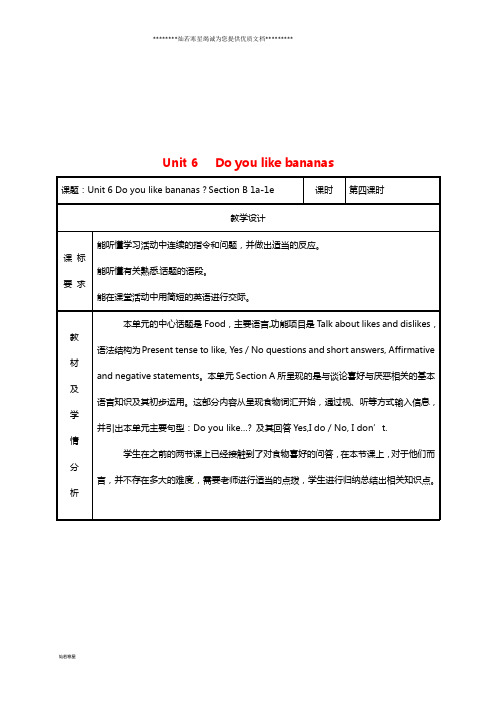
Unit 6 Do you like bananas课题:Unit 6 Do you like bananas?Section B 1a-1e 课时第四课时教学设计课标要求能听懂学习活动中连续的指令和问题,并做出适当的反应。
能听懂有关熟悉话题的语段。
能在课堂活动中用简短的英语进行交际。
教材及学情分析本单元的中心话题是Food,主要语言功能项目是Talk about likes and dislikes,语法结构为Present tense to like, Yes / No questions and short answers, Affirmative and negative statements。
本单元Section A所呈现的是与谈论喜好与厌恶相关的基本语言知识及其初步运用。
这部分内容从呈现食物词汇开始,通过视、听等方式输入信息,并引出本单元主要句型:Do you like…? 及其回答Yes,I do / No, I don’t.学生在之前的两节课上已经接触到了对食物喜好的问答,在本节课上,对于他们而言,并不存在多大的难度,需要老师进行适当的点拨,学生进行归纳总结出相关知识点。
引入新课Step 1.Warming- upand revision1 . Daily greeting to the students.2. Review the words on food. 练习旧知,由此进入新知识的学习Section B, 1a. 1. T: First practice reading the words by2. T: Now, please look at the pictures.4. Check the answers with the students.学生通过对单词和图片again and then listen to a conversation,2. Check the ans wers by asking 听力练习。
七年级人教版英语上册Unit6Doyoulikebananas?学案
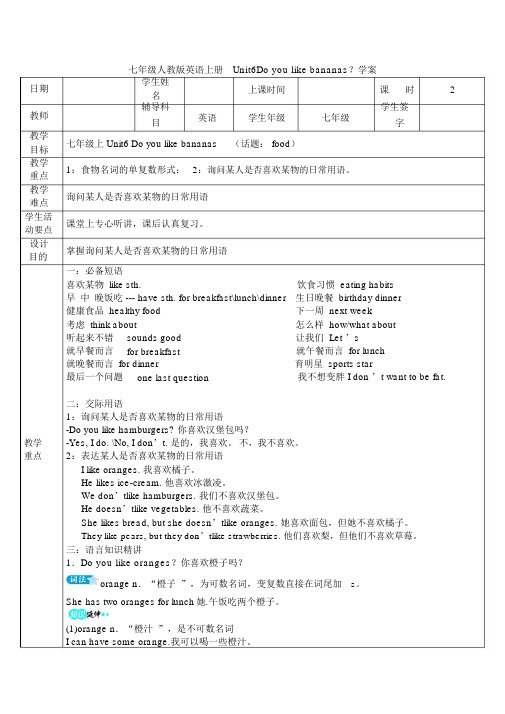
日期教师教学目标教学重点教学难点学生活动要点设计目的七年级人教版英语上册Unit6Do you like bananas?学案学生姓上课时间课时2名辅导科英语学生年级学生签目七年级字七年级上 Unit6 Do you like bananas(话题: food)1:食物名词的单复数形式;2:询问某人是否喜欢某物的日常用语。
询问某人是否喜欢某物的日常用语课堂上专心听讲,课后认真复习。
掌握询问某人是否喜欢某物的日常用语一:必备短语喜欢某物 like sth.饮食习惯 eating habits早中晚饭吃 --- have sth. for breakfast\lunch\dinner生日晚餐 birthday dinner健康食品 healthy food下一周 next week考虑 think about怎么样 how/what about听起来不错sounds good让我们 Let ’s就早餐而言for breakfast就午餐而言 for lunch就晚餐而言 for dinner育明星 sports star最后一个问题one last question我不想变胖 I don ’t want to be fat.教学重点二:交际用语1:询问某人是否喜欢某物的日常用语-Do you like hamburgers? 你喜欢汉堡包吗?-Yes, I do. \No, I don’t. 是的,我喜欢。
不,我不喜欢。
2:表达某人是否喜欢某物的日常用语I like oranges. 我喜欢橘子。
He likes ice-cream. 他喜欢冰激凌。
We don’tlike hamburgers. 我们不喜欢汉堡包。
He doesn’tlike vegetables. 他不喜欢蔬菜。
She likes bread, but she doesn’tlike oranges. 她喜欢面包,但她不喜欢橘子。
七年级英语上册学案 Unit 6 Do you like bananas
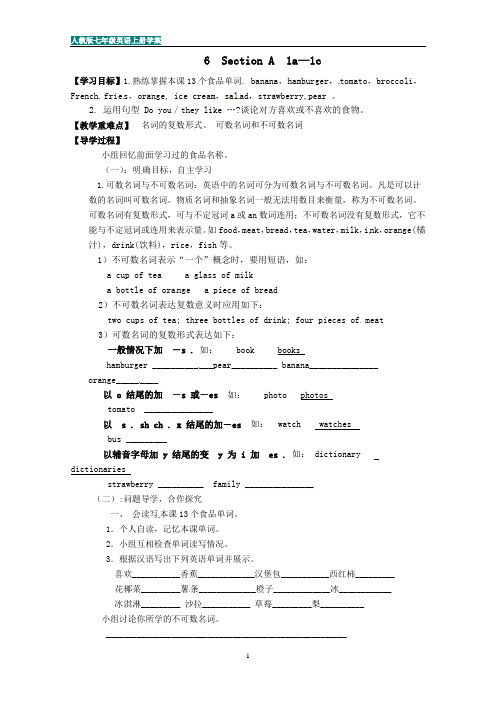
6 Section A 1a—1c【学习目标】1.熟练掌握本课13个食品单词. banana,hamburger,tomato,broccoli,French fries,orange, ice cream,salad,strawberry,pear 。
2. 运用句型 Do you/they like …?谈论对方喜欢或不喜欢的食物。
【教学重难点】名词的复数形式、可数名词和不可数名词【导学过程】小组回忆前面学习过的食品名称。
(一):明确目标,自主学习1.可数名词与不可数名词:英语中的名词可分为可数名词与不可数名词。
凡是可以计数的名词叫可数名词。
物质名词和抽象名词一般无法用数目来衡量,称为不可数名词。
可数名词有复数形式,可与不定冠词a或an数词连用;不可数名词没有复数形式,它不能与不定冠词或连用来表示量。
如food,meat,bread,tea,water,milk,i nk,orange(橘汁),drink(饮料),rice,fish等。
1)不可数名词表示“一个”概念时,要用短语,如:a cup of tea a glass of milka bottle of orange a piece of bread2)不可数名词表达复数意义时应用如下:two cups of tea; three bottles of drink; four pieces of meat 3)可数名词的复数形式表达如下:一般情况下加-s .如: book bookshamburger _____________pear__________ banana_______________ orange_________以 o 结尾的加-s 或-es 如: photo photostomato _______________以s . sh ch . x 结尾的加-es 如: watch watchesbus _________以辅音字母加 y 结尾的变y 为 i 加es .如: dictionary dictionariesstrawberry __________ family _______________(二):问题导学,合作探究一、会读写本课13个食品单词。
新人教版七上英语六单元预习学案

七年级英语上Unit6 预习学案班级姓名【预习目标】复习掌握本单元表食物、蔬菜、水果的单词及几个短语.2.熟练运用本单元句型:—Do you / they like? —Yes, I / they do.—No, I / they don't.—Does she / he/Zhang Ming ? —Yes, she / he does .—No, she / he doesn't. 进行对话交际【预习重难点】可数名词与不可数名词。
1.询问他人喜欢与不喜欢的食物的句型及其回答.Do 和does 的用法。
【预习任务一】学习任务一: 会读写本课13个单词.1.个人自读,记忆本课单词.2.小组互相检查单词读写情况.3.根据汉语写出下列英语单词并展示喜欢___________香蕉_____________汉堡包___________西红柿_________薯条_____________橙子_____________冰____________冰淇淋_________ 沙拉___________ 草莓_________梨__________学习任务二: 谈论对方喜欢或不喜欢的食物。
1. 录音完成1b (面的对话编号)2. 两人一组练习1b 对话.3. Pair work 和你同伴模仿1b对话.编新对话.三、系统总结(教师寄语:No man can do two things at once.)I. 一般情况下加-s .如: book bookshamburger _____________pear__________ banana_______________ orange_________ II. 以 o 结尾的加-s 或-es 如: photo photostomato _______________III. 以s . sh ch . x 结尾的加-es 如: watch watchesbus _________IV . 以辅音字母加 y 结尾的变y 为 i 加es .如: dictionary dictionaries strawberry __________ family _______________【预习任务二】一、自主学习(教师寄语:Many hands make light work. )学习任务一:熟练读、写本课单词及短语。
七年级英语上册 Unit 6 Let’s Go Lesson 36 Let’s Go to the Movie Theatre预习学案冀教版

Lesson 36 Let’s Go to the Movie Theatre!【学习目标】1.熟练掌握本课的重点单词,短语和句型。
2.能够理解对话内容,完成课本上的习题。
【自主学习】---明确目标自学文本任务一:根据Lesson 36 Let’s Go to the Movie Theatre!预习课件掌握本节课的四会单词和短语:任务二:听录音跟读Lesson 36 Let’s Go to the Movie Theatre!课文,跟读2-3遍,了解对话大意。
并完成书中93页的练习题任务三:认真学习下面的知识点,标记出不理解的地方◆ get to到达get to 意为“到达”,是动词短语,后常跟地点或方位名词作宾语。
·They get to Shanghai quickly. 他们快速地到达上海。
【注意】get后如果接的是地点副词,如there,here,home等,其后不加介词to。
【辨析】arrive与get①arrive之后通常接介词at (一般用于较小的地方)或in(一般用于较大的地方)。
②get 之后通常接介词to。
◆ fight v. &n. 搏斗;打架后面常跟介词with,常用结构fight with sb. for sth. 意为“因为某事与某人打架”;fight sb. 意为“与某人打架”。
·He fights(with)the bad man on the street. 他在街上与那个坏人打架。
◆ find out 找出;查明find out强调通过一番努力之后找到事情的真相。
·Please find out when the plane arrives. 请查明飞机什么时候到达。
【辨析】find out,find与look for① find out意为“查清楚”,指把事物查清,搞清楚。
② find意为“找到、发现”,强调找的结果。
③ look for意为“寻找”,强调找的动作。
- 1、下载文档前请自行甄别文档内容的完整性,平台不提供额外的编辑、内容补充、找答案等附加服务。
- 2、"仅部分预览"的文档,不可在线预览部分如存在完整性等问题,可反馈申请退款(可完整预览的文档不适用该条件!)。
- 3、如文档侵犯您的权益,请联系客服反馈,我们会尽快为您处理(人工客服工作时间:9:00-18:30)。
Starter Unit6 学案
第一课时
学一学
1.in the park 在公园里
2.between the hills 在两山之间
3.beside the shop 在商店的旁边
4.under the chair 在椅子下
5.in front of 在┅前面
6.feed the birds 喂鸟
7.swim in the lake 在湖里游泳
8.pi ck the flowers 摘花
9.climb the tree 爬树
10.Where’s the bird? I t’s in the tree.鸟在哪里?它在树上
练习
一.按要求改写句子。
1.There are some reading rooms in the library(改一般疑问句)
______there _____reading rooms in the library?
2. There is a picture on the wall (对划线部分提问)
_____ ______ ______ ______there on the wall.
3.We are English teachers(改为单数)
______ ______ ________ English ________.
4.There are some desks in our classrooms(改为否定句) There_______ ______ ___in our classrooms.5.Heistwelve(对划线部分提问)
______________he?
二.根据句意,用所给单词的适当形式填空。
1.Ben andJim are good at ________(china)
2._______(be) there any tea in the cup.
3.How many _________(po liceman)are there in it?
There are three _______(watch)at my home.
Starter Unit6第二课时
学一学
1.on the left /right of┅在┅左/右边
2.in th e middle of 在┅的中间
3.on the grass 在草坪上
e here. 过来
5.on/i n/under/between/ beside
练习
1.根据句意,用所给单词的适当形式填空
1.We can see two new teaching______(build)in the school.
2.There are many ________(library)in Nanjing.
3.Are there any________(read)rooms in your school?
4.This is ______(I)school .Welcome!
5.The girl behind_________(he) is his sister.
6.He is from ___________(English)
2.根据中文完成句子。
1.你们学校有电脑房吗?当然。
Is t here a ________ ________ in your school? ___________ _______
2.不要在篮球场踢足球。
__________play ______on the _______ ________.
3.在你们市里有一些图书馆吗?
_______ there_______ ______in your city?他有一个朋友。
He _________ _________ _。
